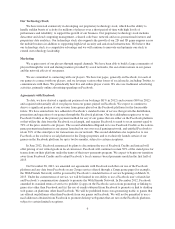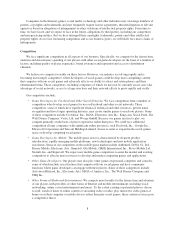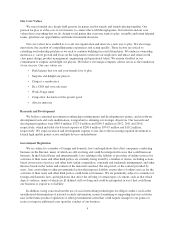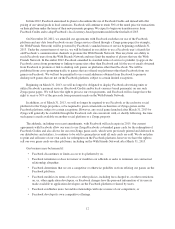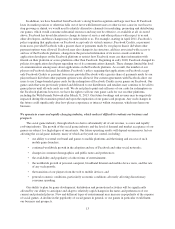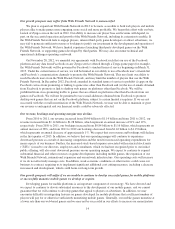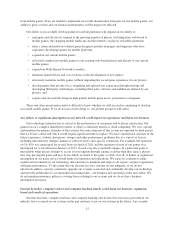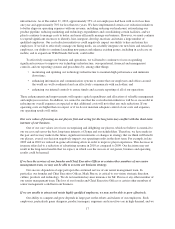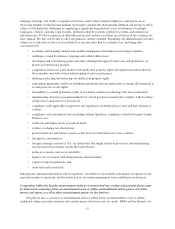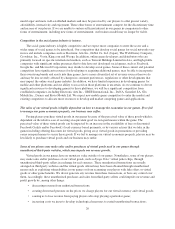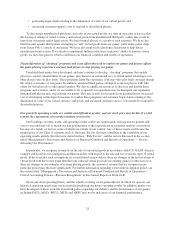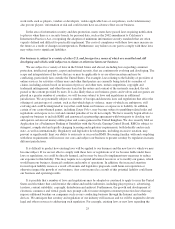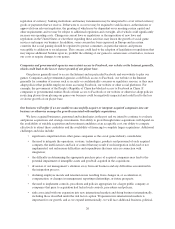Zynga 2012 Annual Report Download - page 24
Download and view the complete annual report
Please find page 24 of the 2012 Zynga annual report below. You can navigate through the pages in the report by either clicking on the pages listed below, or by using the keyword search tool below to find specific information within the annual report.breach caused by hacking, which involves efforts to gain unauthorized access to information or systems, or to
cause intentional malfunctions or loss or corruption of data, software, hardware or other computer equipment,
and the inadvertent transmission of computer viruses could harm our business, financial condition and operating
results. We have experienced and will continue to experience hacking attacks. Because of our prominence in the
social game industry, we believe we are a particularly attractive target for hackers.
In addition, our games involve the storage and transmission of players’ personal information in our facilities
and on our equipment, networks and corporate systems. Security breaches could expose us to litigation,
remediation costs, increased costs for security measures, loss of revenue, damage to our reputation and potential
liability. Our player data and corporate systems and security measures may be breached due to the actions of
outside parties, employee error, malfeasance, a combination of these, or otherwise, and, as a result, an
unauthorized party may obtain access to our data or our players’ data. Additionally, outside parties may attempt
to fraudulently induce employees or players to disclose sensitive information in order to gain access to our
players’ data. We must continuously examine and modify our security controls and business policies to address
the use of new devices and technologies enabling players to share data and communicate in new ways, and the
increasing focus by our players and regulators on controlling and protecting user data.
Because the techniques used to obtain unauthorized access, disable or degrade service, or sabotage systems
change frequently or may be designed to remain dormant until a predetermined event and often are not
recognized until launched against a target, we may be unable to anticipate these techniques or implement
adequate preventative measures. Though it is difficult to determine what harm may directly result from any
specific interruption or breach, any failure to maintain performance, reliability, security and availability of our
network infrastructure to the satisfaction of our players may harm our reputation and our ability to retain existing
players and attract new players.
If an actual or perceived breach of our security occurs, the market perception of the effectiveness of our
security measures could be harmed, we could lose players, and we could suffer financial exposure due to such
events or in connection with remediation efforts, investigation costs, changed security, and system protection
measures.
We rely on a small portion of our total players for nearly all of our revenue.
Compared to all players who play our games in any period, only a small portion are paying players. During
the year ended December 31, 2012, we had approximately 3.4 million MUPs (excluding payers who use certain
payment methods for which unique payer data is not available), who represent approximately two percent of our
total players. We lose players in the ordinary course of business. In order to sustain our revenue levels, we must
attract, retain and increase the number of players or more effectively monetize our players. To retain players, we
must devote significant resources so that the games they play retain their interest and attract them to our other
games. If we fail to grow or sustain the number of our players, or if the rates at which we attract and retain
players declines or if the average amount our players pay declines, our business may not grow and our financial
results will suffer.
We have a new business model and a short operating history, which makes it difficult to evaluate our
prospects and future financial results and may increase the risk that we will not be successful.
We began operations in April 2007, and we have a short operating history and a new business model, which
makes it difficult to effectively assess our future prospects. Our business model is based on offering games that
are free to play. To date, only a small portion of our players pay for virtual goods.
If we fail to effectively manage our human resources, our business and operating results could be harmed.
We have experienced significant turnover in our headcount over the last year, which has placed and will
continue to place significant demands on our management and our operational, financial and technological
16


